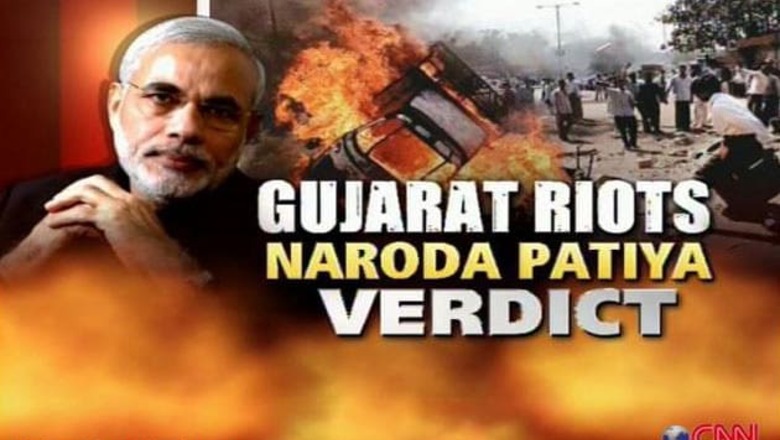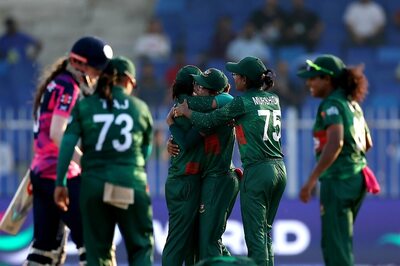
views
Ahmedabad: A decade after 97 people were killed in a massacre during the 2002 Gujarat riots at Naroda Patiya area of Ahmedabad, a special court on Friday sentenced to life 31 people, including sitting Bharatiya Janata Party (BJP) MLA and former minister in the Narendra Modi government, Maya Kodnani.
It is an unprecedented victory for the Special Investigating Team (SIT) appointed by the Supreme Court, which is probing nine Gujarat riot cases, and most importantly for the victims of one of the most brutal and horrific incidents during the Gujarat riots.
With the decision in the Naroda Patiya case, the verdict is out in five of the nine Gujarat riot cases being probed by the SIT and there have been 107 convictions on murder charges as of now. In these cases, as many as 110 people have been awarded life sentence.
The other Gujarat riot cases probed by the SIT in which court verdicts have come are Dipda Darwaza case, Sardarpura case and two cases of Ode killing.
On Friday, the special court awarded life imprisonment to Kodnani, Bajrang Dal leader Babu Bajrangi and 29 other convicts in the 2002 post-Godhra Naroda Patiya riots case on Friday in Ahmedabad. While Maya Kodnani will stay in jail for 28 years, Babu Bajrangi has got life imprisonment till death.
Reacting to the verdict of the court, a victim of the Naroda Patiya riots, Fatima Bibi of Ahmedabad, expressed her happiness and said that the accused would now realise the graveness of their blunder.
She said, "We are happy that the court has given us justice. The accused would now realise the graveness of their blunder. After almost 10 years, I am now feeling relieved that the culprits have been punished."
Social activist Teesta Setalvad, who has taken up the case of the post-Godhra riots victims in Gujarat, said they were "completely satisfied" with the manner in which the court had given "exemplary punishment".
"It is the first time that a politician's involvement in communal violence has been recognised," she said.
The Congress also took the opportunity to hit out at the Narendra Modi government terming the verdict as a milestone.
Reacting to the judgement, Congress spokesperson Rashid Alvi said, "This judgment will prove a milestone for the judiciary."
He further said that the judgement proved that there was rule of law in the country.
The Congress took the opportunity to take a dig at the BJP with Union Minister Kapil Sibal calling it a tit for tat.
The party did not spare Gujarat Chief Minister Narendra Modi in its attack as well, demanding that now the BJP leader must surrender himself before the judiciary.
Hitting out at the Gujarat Chief Minister, Congress leader Digvijaya Singh said, "I congratulate the court. It is the time for the CM to think now. His former home minister is in jail, and now another minister has been convicted. Now he should realise his mistake and surrender himself before judiciary."
Kodnani, who was termed as "a kingpin of riots", will serve 10 years in jail for her conviction under Sec 326 (voluntarily causing grievous hurt by dangerous weapons or means), after which her life imprisonment under Section 302 and other sections, which is for 18 years, will begin.
Usually the jail sentences run concurrently but the special court of judge Jyotsana Yagnik on Friday, who pronounced the sentences in the Naroda Patiya massacre case, said that the terms would run one after the other.
"Court has passed judgement on 31 accused. Accused No. 18 Babu Bajrangi has been given imprisonment till he dies. Maya Kodnani has been given 18 years jail in one section and 10 years in another section. The court has said that till this 10 years imprisonment is not completed, life sentence will not be counted," said counsel for victims Shamshad Pathan.
Out of the remaining 30 convicts, one is absconding, 22 will serve minimum 14 years in prison, seven will serve minimum 21 years.
The Narendra Modi government in Gujarat has also been asked to give Rs 5 lakh to a woman who was gangraped.
"Communal riots are like cancer on Constitutional secularism and the incident in Naroda Patiya was a black chapter in the history of the Indian Constitution," the Judge observed.
"Acts of communal violence was brutal, inhuman and shameful, it was a clear incident of human rights violation as 97 people were killed brutally within the day which included helpless women, children aged persons and the climax of this inhuman and brutal act of violence was reflected in murder of an infant who was 20 days old," the court said highlighting the enormity of the crime.
Though maintaining that death penalty was "desirable" to reduce crime in the society, the court said it believes that such a punishment "undermines human dignity".
"Death penalty brings justice and it is desirable to reduce the crime in the society but this court cannot overlook the global trend prevalent in recent years as by 2009, 139 countries have repealed death sentence and there is a global campaign against death penalty and progressive societies are advocating for restricting death penalty and this court believes use of death undermines human dignity".
It rejected the defence's argument that communal violence in Naroda Patiya was a reaction to Godhra train burning incident.
"This was a pre-planned conspiracy and it cannot be mitigated just by saying that it was a reaction of Godhra train burning incident," it said.
(With Additional Inputs from PTI)



















Comments
0 comment